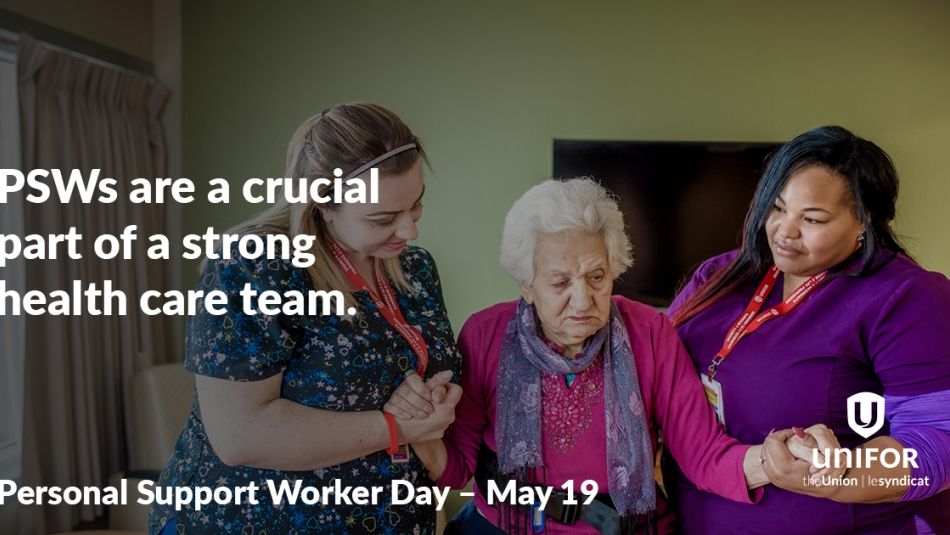
Share
In celebration of Personal Support Worker Day May 19, Unifor celebrates the contributions of the thousands of Unifor members employed as Personal Support Workers (PSWs) in Ontario, Continuing Care Assistants (CCAs) in Nova Scotia and health care workers across the country.
“PSWs and CCAs are the heavy lifters of our health care systems,” said Jerry Dias, Unifor National President. “These frontline health care workers provide indispensable support to seniors, people with disabilities, and patients facing chronic health conditions.”
Personal Support Workers and Continuing Care Assistants are vital members of the patient care team. Their work and human touch is critical to and appreciated by residents and clients. Unfortunately due to continued cost cuts, the shortage of these workers to provide home care and long-term care has reached a crisis point.
Unifor is calling on the Ontario government to address the issues facing PSWs in the province immediately. The union has long advocated for a regulatory minimum of four hours per patient of standard of care in long-term care homes.
In late 2017, MPPs of every political stripe passed Bill 33 Time To Care Act through second reading. Is This Bill would have delivered four hours of care to every resident, every day. This minimum, measurable, enforceable standard of care would ensure staff to resident ratios are reduced to allow for safe and dignified care.
“Conservative MPPs unanimously voted in favour of Bill 33 but now have changed their tune by only committing to building more beds and refurbishing older homes. Premier Doug Ford is well aware new beds alone will not solve the ongoing crisis in long-term care. Ford is more focused on providing handouts to his corporate friends than addressing the roots of the problem,” said Dias.
In Nova Scotia, Unifor submitted a formal proposal to the Expert Advisory Panel in Long Term Care, whose final report in January 2019 outlined immediate and urgent action items the government must take in order to address issues of patient safety and worker recruitment and retention. As the six-month mark approaches, Unifor intends to examine how many of the recommendations have been implemented and whether workers and long-term care residents have indeed benefitted.
“Our members in Nova Scotia have sounded the alarm on how urgent the health care crisis has become, particularly in long-term care,” said Dias. “The government has a starting point to address CCA recruitment and retention with the Expert Panel’s review and recommendations. We’re speaking with our members regularly and need to see the government take long-term care issues seriously.”
The union believes the conditions of work are linked to the conditions of care. Front line caregivers experience verbal, sexual and physical violence regularly. Employers tend to ignore and normalize harassment as part of the job of PSWs and CCAs. Unifor demands provincial governments provide adequate funding to ensure care and safe staffing levels in long-term care homes to keep pace with residents’ increasing acuity.
As Ontario moves forward with fundamental health system transformation, we need to respect the lessons of the past, including the recent experiences with health authority amalgamation and centralization experienced in Nova Scotia. Governments must help end the destructive practice of for-profit companies bidding for home care contracts, exerting downward pressure on wages and conditions of employment. When it comes to caring for our parents and grandparents, we must avoid a race to the bottom that offers the least amount of care.
For more information, please visit www.caretakestime.ca


